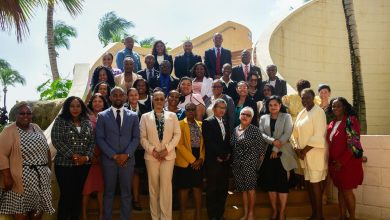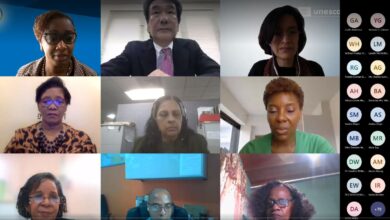|
It is my pleasure to welcome you all on behalf of the Directorate of Human and Social Development. Our Directorate has worked assiduously over the past year to support the flagship activity of the Community, which is the accelerated implementation of the CARICOM Single Market and Economy. Many of the activities in which we have been engaged are being discussed at this meeting. In fact our deliberations which focus on investing in human resources with special reference on Labour is a continuation of the dialogue we started in this Council in October 2000 when we first presented our integrated theme: Investing in human Resources with Equity. This theme was recognized by COHSOD V as a most effective way to organizing the seemingly disparate social programmes in education, health, labour, gender, youth, culture, sport, crime and drugs Hence we have more and more been able to demonstrate at these meetings how much synergy there is between the sectors that fall within this Directorate. So for example although we focus on Labour in this COHSOD the presentations and hopefully the discussions and policies and recommendations that emerge would fully illustrate the value of an approach that is intersectoral. Ø How can you for example discuss a human and social development strategy without ascertaining the links between labour, health and education to begin with? Ø How do you explain productivity of the work force without reference to skills training, Technical and vocational education and workers health? How do we hope to eradicate poverty without placing emphasis on special assistance to disadvantaged groups that involve education, health, employment generating schemes, and social security programmes? Ø How do we begin the conceive of a viable CSME that facilitates the free movement of people and the interchange of jobs and investment opportunities without creating the mechanism for accreditation, and standardization, and programmes that harness our cultural talents and engage the people of this region? These are all issues underlying the discussions at this meeting that places emphasis on the role of labor in the development of a Human and Social Development strategy and with policies and programmes for making our regional workforce more competitive in the global area. Highlighting Some Regional Programmes Over the past year the Directorate has spearheaded many endeavors in collaboration with several Partners and in collaboration with other Directorates within the Secretariat and organs or institutions of the Community. The new strategic emphasis in our Youth and Development Programme was fashioned in collaboration with UNICEF, UNFPA, and the Commonwealth Youth Programme. In our midst today we are pleased to acknowledge the presence of three of our CARICOM Youth Ambassadors: Michael Alexander, Dean of the of the CYA Corp from Trinidad and Tobago, Joel Richards St. Vincent and the Grenadines, out going Dean for 2002 and Raymond Price, a Jamaican, Coordinator of the Caribbean HIV/AIDS Youth Network. They are presently CARICOM interns working on Youth and HIV/AIDS projects and sponsored by the CARICOM/European Union Institutional Strengthening Project for HIV/AIDS and GTZ of Germany. This year the Pan Caribbean Partnership Against HIV/AIDS has expanded its range of activities to include communications and information networks and legal issues and the reduction of stigma against PLWA with the assistance of USAID and CIDA. The increase in staff for the PANCAP Coordinating Unit located at CARICOM has facilitated more effective collaboration with our core Partners, CAREC CHRC, CRN+, UNAIDS and UWI the Caribbean National HIV/AIDS Programme Coordination which represents the NAPS at country level. The Directorate also coordinates the activities of the CARICOM Task Force on Crime and Security, located in Trinidad and Tobago and supported by that Government. It has established a basis for greater collaboration among CARICOM states in their approach to fighting crime. Proposals for joint surveillance, border and maritime security, are part of a comprehensive regional plan of action But it is recognized that a regional plan for crime and security cannot be successful unless member states assume responsibilities for the establishment of National Commissions on law and order and the implementation of national anti-crime master plans. Our Gender programme has consolidated the work on gender mainstreaming and has fully demonstrated that gender is indeed a cross cutting element in a Human and Social Development Strategy. In the area of Education, the major focus has been on getting the structures of accreditation and standardization in place, which means close collaboration with our CSME Unit and the Legal Division and the Commonwealth Secretariat. It also means developing the mechanisms for hassle free travel and thereby facilitating the rational movement of skills across the single market and single economy. At this meeting a report would be presented from the meeting of Education officials on role of Technical and Vocational Education as a skills enhancement exercise that is invaluable to the workforce of this Region. In the area of Culture, the Directorate has spearheaded discussions based on research from UWI that is designed to ensure that cultural products yield dividends for the artists and artistes and that cultural Festivals like Carnival Mashriamani and CARIFESTA become more economically viable. This meeting will a focus on the proposals arising from the Symposium at CARIFESTA VII in Suriname on how to improve the organisation and delivery of future CARIFESTAs. These are just some of the programme areas in which the Directorate has been involved in over the past year. Others include: the facilitation of the Regional Civil Society Council; the work of the Futures Policy Group; the special programme on Institutional Strengthening on HIV/AIDS sponsored by the European Union and coordinated by CARICOM; the development of the Regional Strategic Plan on Demand reduction for drugs; the plan of action for the Rights of the Child in collaboration with UNICEF and a programme in Education and HIV/AIDS with UNESCO. We take this opportunity to thank Minister Walter Sandriman of Suriname for the leadership he provided over the past year. We regret that he is unable to be with us. At the same time, we welcome the Honourable Lawrence Achong, the Incoming COHSOD Chair. |
|
|
|
Press ReleasesSpeeches





